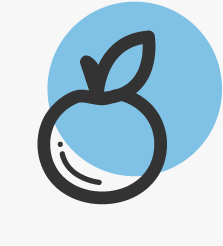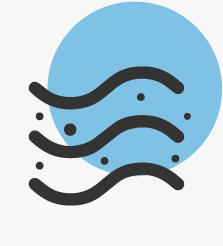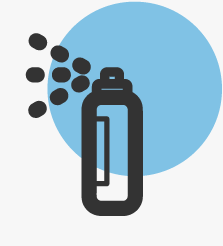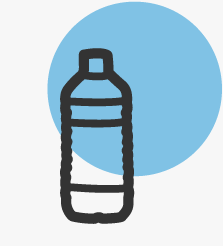By learning to identify where and how chemicals enter our bodies, we can reduce what we are exposed to and protect our health.
TEACHING OTHERS: TOXIC EXPOSURES
Healthy Habits for
Healthy Humans
The Healthy Habits for Healthy Homes (H4) program, developed by the New Brunswick Lung Association, includes the resources you need to deliver an effective behaviour change program to a group. Pilot tested in a variety of group settings, including high school, community college, and university, and new Canadians classes, H4 can be customized and tailored to your audience’s interests to maximize engagement. Simple, effective tips to reduce exposure to toxics in our environment while also saving money, are appealing to participants and provided in both a Powerpoint presentation and printable pamphlets.
The optional “homework” assignment takes the message further by encouraging participants to engage additional people in their networks to commit to a simple action, and holds them accountable as the participant follows up with them after a number of weeks.
Many factors contribute to our overall health and maintaining our health is a lifelong endeavour. Controlling our exposure to harmful chemicals, toxins and other environmental hazards can be challenging, especially for those who are unaware of the potential for risk. We are exposed to environmental hazards daily, often without knowing. The signs and symptoms of exposure can vary from person to person and some may take years of exposure to impact our overall health.
With these resources and tools, it is our hope to bring awareness to the issues we face when it comes to maintaining overall health and decrease exposure to environmental toxins in our everyday lives. Activities we do everyday in our homes can have a major impact on our exposure to environmental toxins and hazards.
Simple modifications in six key aspects of our daily lives can help improve our overall health and decrease our potential for exposure.
Dig Deeper.
By learning to identify where and how chemicals enter our bodies, we can reduce what we are exposed to and protect our health.
FOODS WE EAT
What we eat affects our health and wellness. Just because a food product is on the grocery store shelf does not mean that it is good for you or that you should eat it.
hOW WE CLEAN OUR HOMES
Keeping your home clean is no easy chore, but is very important for your health. Dust is not just dead skin and hair, it often contains chemical residues and metals like lead and mercury.
INDOOR AIR QUALITY
We spend a lot of time inside our homes, especially during the cold Canadian winters. The air we breathe is important to our health.
pERSONAL cARE pRODUCTS
Health and beauty products have an ugly side as many ingredients are either not listed and/or are known toxins.
pesticides
Pesticides is the term used for any substance that kill what we consider pests. These include herbicides to kill plants, insecticides, fungicides, and rodenticides.
Sign Up to get our Newsletter
Get the latest Resilient Health Updates!
Together, we can achieve wellness for all, and an environment to support us for generations to come.
We have a vision of a healthy, resilient Canada where human health and the environment are thriving. Our services and programming rely on donations from people like you. You can help champion environmental health by donating today, becoming a monthly donor, or leaving a legacy gift in your will.
The Foundation for Resilient Health is a project of the New Brunswick Lung Association, a registered charity with over 80 years of trusted health services in our community.






